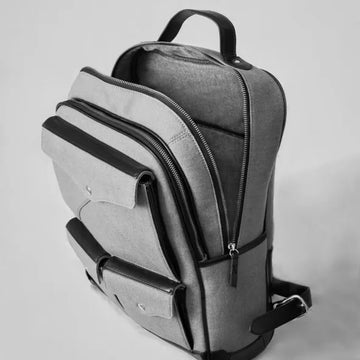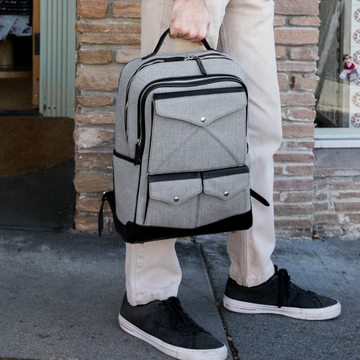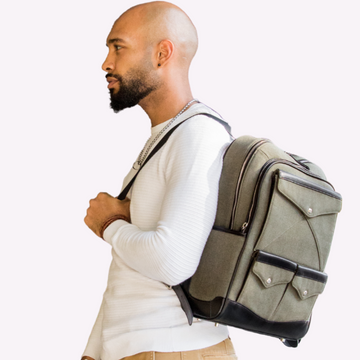Introduction:
In recent years, the demand for vegan products has surged dramatically, driven by ethical concerns, environmental consciousness, and a growing appreciation for cruelty-free alternatives. This shift in consumer preferences has extended to the realm of backpacks, with designers and manufacturers innovating to create stylish, functional, and sustainable options. In this article, we delve into the latest trends shaping the world of vegan backpack design, from materials to features, and explore how these trends are revolutionizing the industry.
Sustainable Materials:
One of the defining characteristics of modern vegan backpacks is the emphasis on sustainable materials. Traditionally, backpacks were made from leather or other animal-derived materials, but advancements in textile technology have paved the way for eco-friendly alternatives. Today, designers are increasingly turning to materials such as recycled polyester, organic cotton, hemp, and cork to craft durable and environmentally responsible backpacks.
Innovative Designs: Vegan backpacks are no longer confined to a limited range of styles. Designers are pushing boundaries with innovative and creative designs that cater to diverse preferences and lifestyles. From sleek minimalist backpacks for urban commuters to rugged and functional options for outdoor enthusiasts, there is a vegan backpack to suit every need and aesthetic.
Multi-Functionality:
Versatility is key in today's fast-paced world, and vegan backpacks are adapting to meet the demands of modern consumers. Many backpacks now feature multiple compartments, padded laptop sleeves, water bottle pockets, and adjustable straps for added convenience and functionality. Whether you're navigating city streets or exploring the great outdoors, a well-designed vegan backpack can effortlessly transition between different activities and environments.
Ethical Production Practices:
In addition to being cruelty-free, consumers are increasingly concerned about the ethical practices of the companies behind their favorite brands. Transparency in the supply chain, fair labor practices, and commitment to social responsibility are becoming important factors for conscious consumers when choosing a vegan backpack. Brands that prioritize ethics and sustainability are gaining traction in the market and setting new standards for the industry.
Customization and Personalization:
As consumers seek products that reflect their individuality, customization and personalization options are becoming more prevalent in the world of vegan backpacks. Whether it's choosing your preferred color, adding personalized embroidery, or selecting custom features, brands are offering ways for customers to tailor their backpacks to their unique style and preferences.
Technology Integration:
With the rise of digital nomadism and remote work, there is a growing demand for vegan backpacks that seamlessly integrate technology. Backpacks with built-in USB charging ports, RFID-blocking pockets, and dedicated laptop compartments are becoming increasingly popular among tech-savvy consumers who value both functionality and sustainability.
Lightweight and Ergonomic Design:
Comfort is paramount when it comes to backpacks, especially for those who carry them for extended periods. Designers are prioritizing lightweight materials and ergonomic designs to ensure maximum comfort without sacrificing durability. Adjustable straps, padded back panels, and breathable mesh are some of the features that contribute to a more comfortable carrying experience.
Minimalist Aesthetics:
In line with the minimalist lifestyle trend, many vegan backpacks are adopting clean, streamlined designs that prioritize simplicity and functionality. Minimalist backpacks are characterized by their understated aesthetic, with no unnecessary embellishments or bulky features. This focus on simplicity appeals to consumers seeking a more pared-down approach to their belongings.
Water-Resistant and Weatherproofing:
For outdoor enthusiasts and urban adventurers alike, weather resistance is a crucial consideration when choosing a backpack. Vegan backpacks are now being treated with water-resistant coatings or constructed from inherently water-repellent materials to protect belongings from the elements. Additionally, sealed seams and waterproof zippers help to ensure that the contents of the backpack remain dry even in inclement weather.
Gender-Inclusive Design:
Traditionally, backpacks were marketed with gender-specific designs, but there is a growing trend towards gender-inclusive options that cater to all individuals regardless of gender identity. Brands are offering backpacks with adjustable straps and ergonomic designs that accommodate a wide range of body types, ensuring that everyone can find a comfortable and stylish option that suits their needs.
Conclusion:
The landscape of vegan backpack design is constantly evolving, driven by a combination of consumer demand, technological innovation, and ethical considerations. As awareness of the environmental and ethical implications of our purchasing decisions continues to grow, the demand for sustainable and cruelty-free products like vegan backpacks will only continue to rise. By staying attuned to the latest trends and embracing innovation, designers and manufacturers can meet the needs of conscious consumers while contributing to a more sustainable and compassionate future.







